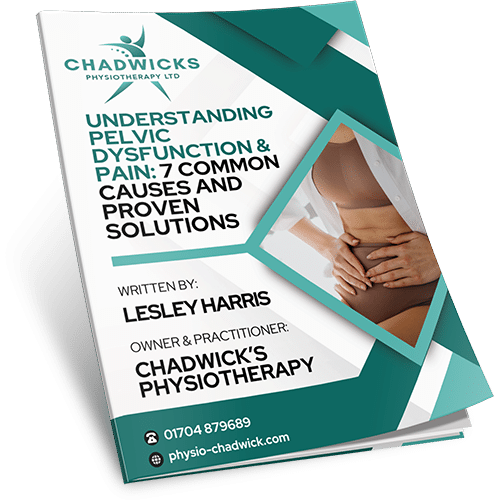Pelvic Health
Many women experience symptoms related to prolapse or bladder control that disrupt their routines – needing to plan outings around toilet access or avoiding social activities altogether. For men, these issues often arise following prostate surgery or as a result of long-term pelvic floor weakness.
What Is Pelvic Health?
Pelvic health concerns are more common than many people realise – and they can have a serious impact on quality of life. At Chadwick’s Physiotherapy, we offer specialist pelvic health support for both men and women dealing with issues related to bladder and bowel control, post-surgical recovery and pelvic floor dysfunction.
These problems are often sensitive and difficult to talk about, but they’re also treatable – and you’re not alone. With the right guidance, support and personalised care, many people see significant improvements in their symptoms, confidence and ability to enjoy daily activities.
What Are The Symptoms Of Pelvic Floor Dysfunction?
Pelvic floor issues can affect people at any stage of life. Some of the most common symptoms we help with include:
- Urinary urgency or frequency
- Leakage with coughing, sneezing, or exercise
- Difficulty controlling the bladder or bowels
- A feeling of heaviness or pressure in the pelvic area (often linked to prolapse)
- Discomfort following childbirth or surgery
- Pain during movement, exercise, or intimacy
- Reduced confidence or limitations in daily activity
Many women experience symptoms related to prolapse or bladder control that disrupt their routines – needing to plan outings around toilet access or avoiding social activities altogether. For men, these issues often arise following prostate surgery or as a result of long-term pelvic floor weakness.
It’s not uncommon for people to try online pelvic floor exercises or apps with little success. Without proper assessment and support, it can be hard to know if you’re doing the right things – or doing them correctly.
What Is Our Approach To Fixing/Treating Pelvic Floor Dysfunction?
Our pelvic health sessions begin with a private, supportive conversation about your concerns, medical history, and daily symptoms. We take the time to understand your experience – no rush, no judgment – and begin to identify what might be contributing to the problem.
Because the pelvic floor is a group of muscles, we assess how well they’re working. This usually involves a physical examination to test muscle strength, coordination and endurance. We may also use biofeedback technology – a non-invasive tool that helps track your pelvic floor function and shows progress over time.
Treatment typically includes:
- Tailored Pelvic Floor Exercises – You’ll learn how to correctly activate and strengthen your pelvic floor muscles, with a plan that matches your ability and routine.
- Biofeedback Training – Visual or sensory feedback helps you better understand and improve how your pelvic floor muscles function.
- Nerve Stimulation (if appropriate) – Gentle, targeted stimulation can support muscle re-education and enhance recovery in some cases.
- Ongoing Support and Education – We guide you step by step, helping you build strength and regain control without feeling overwhelmed or embarrassed.
Every plan is personalised – because no two people experience these issues in the same way.
Download Free Report
Pelvic floor problems can be life-limiting, but they don’t have to be permanent. With the right treatment and support, meaningful improvement is absolutely possible. Download our free Pelvic Health Pain Report to learn more about what causes pelvic floor dysfunction and how you can start making progress today – in a way that’s clear, comfortable and completely tailored to you.



